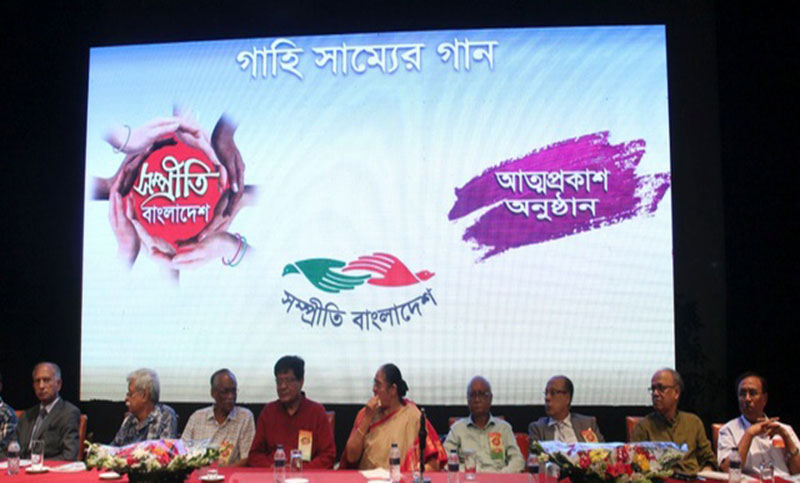Harmony Bangladesh to promote secular ideals
About 400 people from every religion took part in the event. For Hindu leader, there is a need to "return to the Liberation War ideal of secularism". Islamic leader calls for the implementation of the “Medina Charter”, slams the ideas of radical preachers.
Jul 20, 2018

By Sumon Corraya
Sampriti Bangladesh (Harmony Bangladesh) is a new organisation that was launched at the National Museum in Dhaka to promote secular ideals in the country. It is the brainchild of a number of interfaith groups.
“We want to return to the Liberation War ideal of secularism,” said the organisation’s convener, Pijush Bandyopadhyay, a Hindu.
“By returning to that ideal, we will be able to build a secular Bangladesh – one where everyone is equal and where no one faces persecution.” The Liberation War took place in1971 when the country was still known as East Pakistan.
He is aware that Sampriti Bangladesh’s development could encounter obstacles, from radical Islamic factions for example.
In fact, in recent years there have been various episodes of violence and intolerance towards free thinkers, bloggers and intellectuals whose murder was justified because of their alleged atheism.
“We know that most people in our country are against sectarianism and in favour of equality,” said Pijush. “Now we must remain united. If we all stay together, we will eventually win.”
The event, titled Sing song of equality, brought together about 400 people. Some 20 leading Christian figures, including one priest and eight nuns, were present, including Nirmol Rozario, president of the Bangladesh Christian Association (BCA),
“It has taken its first step with a noble purpose,” Rozario said. “In this country, most Muslims are moderate, whilst radicals are really a small fringe. If the majority work in harmony, we can hope to build a harmonious country.”
The organisation plans to sponsor activities to disseminate secular ideas and organise protests in case of persecution.
Shameem Mohammad Afzal, director general of the Islamic Foundation, maintains that the Constitution approved in 1972 reflects the Medina Charter, which Mohammed drafted in 622 AD to overcome the divisions among the tribes and create social rights and duties of the Ummah, the new Islamic community.
“We live in a country where we are all the same,” said Prof Muhammed Zafar Iqbal, a well-known writer. “There are only small differences in religion and tribal affiliation. Yet harmony is lacking.”
“We Muslims, who are the majority, fail to provide protection to minorities,” he noted. “All development projects such as the Metro Rail, the Padma bridge (a mega project that began in 2014), satellites, big construction, will be in vain.”
At the same time, “it is so easy to make life joyful. Just do something for others, and you can be happier. If we do not ensure a joyful life for minorities, we cannot say that we have done our duty. I think that people with different faith or colour can live in joy in the same society.” “Bangladesh is a nation in which communal harmony exists,” said Prof Anisuzzaman in a video message shown at the meeting. “People of different ethnic and religious background have been living in peace for thousands of years. --Asia News







Total Comments:0